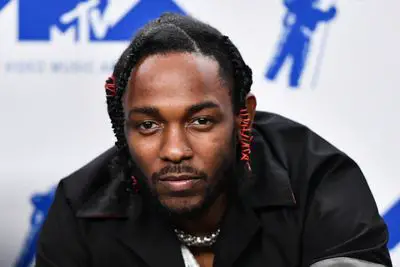On This Day: Kendrick Lamar Doubted Everything on “DAMN.”
The prophetic rapper released this iconic masterpiece on this day in 2017,
On this day in 2017, Kendrick Lamar evolved from a rapper into a prophet.
"Is it wickedness? Is it weakness?" he asks his listeners on "BLOOD." "Are we gonna live or die?" Lamar responds to these questions by telling a beguiling story about being shot by a blind lady, whom the rapper was only trying to assist in finding an allegedly lost possession. The album's interlude, nearly two-minutes long, is a representation of the consequences of damnation as referenced in the Book of Deuteronomy. The blind woman represents the duality of "obeying God and being blessed, or disobeying him and being damned." Do we give into wickedness, or instead admit our weaknesses and submit ourselves to a higher power?
It's complex questions like these that drive the album and are part of why it was nominated for 7 Grammys and was the first rap album to ever win a Pulitzer Prize. Putting the album's profound musicality aside, Lamar has always embraced the idea of being a divine messenger. His lyricism often combats the social and political confines he desperately wants to unravel. "I'd rather die than listen to you!" he curses at Fox News in "DNA."
He has often spouted complex ideology, both in interviews and in his music, which includes skepticism of the moon landing and disbelief in the voting process. He refuses to be told his views are wrong, and he reminds his opposition of this throughout DAMN. But he's got evidence to back it up, and to challenge Lamar and his beliefs has proven to be the equivalent of setting off a nuclear bomb. During a 2013 guest feature on Big Sean's "Control," he called out 11 rappers by name, merely because he could. All of them were upper-echelon figures like Drake, Pusha T, and even Big Sean himself, and no one dared reply or fight back. "I'm willing to die for this sh*t," he raps on "ELEMENT." "Put the Bible down and go eye for an eye for this sh*t."
But Lamar's confidence in his craft shouldn't be confused with arrogance. He is often humbled by the divine powers that surround him and lives in fear of all that he doesn't understand. "If I could smoke fear away, I'd roll that motherf*cker up," he says on "FEAR." In the song's second verse, he goes on to list all the ways he could die as a black man in America, the anxiety building in his voice as the list gets longer and longer.
His numerous awards and reputation as one of the greatest living artists of all time doesn't save him from premature death in Trump's America. Released just a few months into Donald Trump's presidency, the album is in stark contrast to 2015's To Pimp a Butterfly. The latter is filled with resounding hope, featuring an album cover that depicts Kendrick and all his riled up friends posing on the White House lawn. Everything is gonna be "Alright," Lamar says. But the former, whose album cover features a lethargic Kendrick Lamar in a white tee looking emotionally defeated, views his blackness as a curse once again. He was a beacon of hope and a voice of the people in 2015, but now Lamar feels alone and terrified.
DAMN. isn't filled with much hope for the future, and Lamar doesn't necessarily have any answers to the questions that plague him. He recognizes he's some sort of divine figure, but is it divine to admit you have divinity? Lamar calls out false gods, but in doing so, doesn't that sort of strip him of his humility? He straddles the line between saint and sinner, all while fearing for his life in a political landscape that wants him gone.
So in his self-reflection, Lamar turns the spotlight onto the Americans of color who face the same struggle as him. "Are we damned by our existence in America? Or are we damned by our reliance on a theology that paints us a cursed people?" writes NPR. "Is it the inherent wickedness of America's racialized politics or our weakness as a people that we must overcome?"
DAMN.'s power is in its unease. Lamar forces his fans to grapple with the same agonizing questions he does. But that is what prophets do; they turn the spotlight onto the very people who rely on them for salvation. To be saved is to challenge every inch of the fabric of your society, and even that may be enough. Lamar reminds us that salvation may not even exist, but that doesn't mean we should stop searching.
Revisit this iconic masterpiece below:
DAMN.
